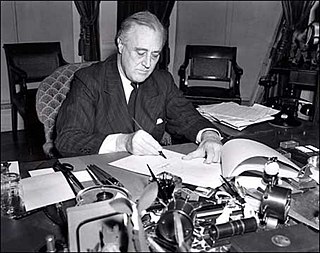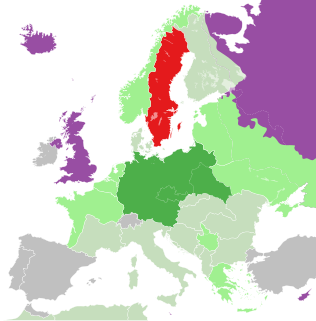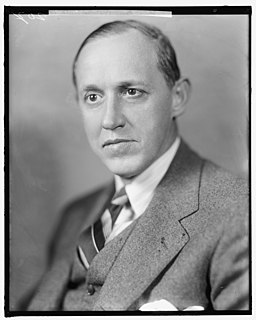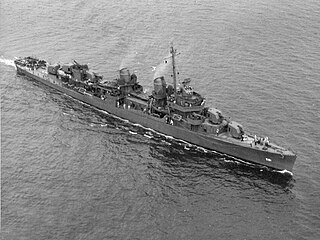Related Research Articles

United Nations Relief and Rehabilitation Administration (UNRRA) was an international relief agency, largely dominated by the United States but representing 44 nations. Founded in November 1943, it was dissolved in September 1948. it became part of the United Nations in 1945. Its purpose was to "plan, co-ordinate, administer or arrange for the administration of measures for the relief of victims of war in any area under the control of any of the United Nations through the provision of food, fuel, clothing, shelter and other basic necessities, medical and other essential services". Its staff of civil servants included 12,000 people, with headquarters in New York. Funding came from many nations, and totalled $3.7 billion, of which the United States contributed $2.7 billion; Britain, $625 million; and Canada, $139 million.

Lend-Lease, formally the Lend-Lease Act and introduced as An Act to Promote the Defense of the United States, was a policy under which the United States supplied the United Kingdom, the Soviet Union and other Allied nations with food, oil, and materiel between 1941 and 1945. It was given on the basis that such help was essential for the defense of the United States; this aid included warships and warplanes, along with other weaponry. It was signed into law on March 11, 1941, and ended on September 20, 1945. In general, the aid was free, although some hardware were returned after the war. Canada, already a belligerent, supplemented its aid to Great Britain with a similar, smaller program called Mutual Aid.

The International Rescue Committee (IRC) is a global humanitarian aid, relief, and development nongovernmental organization. Founded in 1933 as the International Relief Association, at the request of Albert Einstein, and changing its name in 1942 after amalgamating with the similar Emergency Rescue Committee, the IRC provides emergency aid and long-term assistance to refugees and those displaced by war, persecution, or natural disaster. The IRC is currently working in about 40 countries and 26 U.S. cities where it resettles refugees and helps them become self-sufficient. It focuses mainly on health, education, economic wellbeing, power, and safety.

Sweden maintained its policy of neutrality during World War II. When the war began on 1 September 1939, the fate of Sweden was unclear. But by a combination of its geopolitical location in the Scandinavian Peninsula, realpolitik maneuvering during an unpredictable course of events, and a dedicated military build-up after 1942, Sweden kept its official neutrality status throughout the war. At the outbreak of hostilities, Sweden had held a neutral stance in international relations for more than a century, since the end of the Napoleonic Wars in 1814 and the invasion of Norway.

Harry Lloyd Hopkins was an American statesman, public administrator, and presidential advisor. A trusted deputy to President Franklin Delano Roosevelt, Hopkins directed New Deal relief programs before serving as the 8th United States Secretary of Commerce from 1938 to 1940 and as Roosevelt's chief foreign policy advisor and liaison to Allied leaders during World War II. During his career, Hopkins supervised the New York Temporary Emergency Relief Administration, the Federal Emergency Relief Administration, the Civil Works Administration, and the Works Progress Administration, which he built into the largest employer in the United States. He later oversaw the $50 billion Lend-Lease program of military aid to the Allies and, as Roosevelt's personal envoy, played a pivotal role in shaping the alliance between the United States and the United Kingdom.

The Arctic convoys of World War II were oceangoing convoys which sailed from the United Kingdom, Iceland, and North America to northern ports in the Soviet Union – primarily Arkhangelsk (Archangel) and Murmansk in Russia. There were 78 convoys between August 1941 and May 1945, sailing via several seas of the Atlantic and Arctic oceans, with two gaps with no sailings between July and September 1942, and March and November 1943.
The 164th Infantry Division was an infantry division of the German Army during World War II. Formed in November 1939, the division took part in the invasion of Greece in April 1941. In January 1942, consolidating the Axis seizure of the island during the Battle of Crete, the 164th was reorganized as Fortress Division Kreta (FDK). In mid-1942 the division was transferred to North Africa and re-designated as 164th Light Afrika Division. It surrendered in May 1943 in Tunisia at the end of the North African Campaign.

The 163rd Infantry Division was a German Army infantry division in World War II. Formed in November 1939, it was engaged in the invasion of Norway the following year. It fought alongside the Finnish Army during Operation Barbarossa against the Soviet Union. During this time, the division's transit through neutral Sweden caused the Midsummer Crisis of 1941. The division spent most of the war in Finland, before being returned to Germany. It was destroyed in March 1945 in Pomerania by the First Polish Army, subordinated to the Soviet 1st Belorussian Front.

The Allies, formally referred to as the United Nations from 1942 were an international military coalition formed during the Second World War (1939–1945) to oppose the Axis powers, led by Nazi Germany, Imperial Japan, and Fascist Italy. Its principal members by 1941 were the United Kingdom, United States, Soviet Union, and China.

Spyros Panagiotis Skouras was a Greek-American motion picture pioneer and film executive who was the president of 20th Century-Fox from 1942 to 1962. He resigned June 27, 1962, but served as chairman of the company for several more years. He also had numerous ships, owning Prudential Lines.

USS Charrette (DD-581) was a Fletcher-class destroyer of the United States Navy, named for Lieutenant George Charrette (1867–1938), who was awarded the Medal of Honor for heroism during the Spanish–American War. Entering service during World War II, she spent her career in the Pacific theatre. Placed in reserve following the war, Charette was transferred to the Kingdom of Greece in 1959 and renamed Velos (D16), remaining in service till 1991 before being preserved as a museum ship at Palaio Faliro, Athens.
George P. Skouras was an American movie executive and president of United Artists Theatres, born in Skourohorion, Greece. He was one of ten children of a sheep herder and his wife. He and two older brothers emigrated to the United States about 1910 and rose in the new movie industry to become top movie executives. The extended Skouras family continue to be actively involved in the Hollywood film industry today.
Skouras Pictures was an American independent movie distribution company that was founded by Tom Skouras in 1983. The company distributed more than 200 movies between 1983 and 1995, including notable films as Blood Simple, My Life as a Dog, The Comfort of Strangers and Apartment Zero.

SS Kurtuluş was a Turkish cargo ship which became famous for her humanitarian role in carrying food aid during the famine Greece suffered under the Axis occupation in World War II. She sank on 20 February 1942 in the Sea of Marmara during her fifth voyage from İstanbul, Turkey to Piraeus, Greece. In Turkish, “kurtuluş” means "liberation".

The neutral powers were countries that remained neutral during World War II. Some of these countries had large colonies abroad or had great economic power. Spain had just been through its civil war, which ended on 1 April 1939 —a war that involved several countries that subsequently participated in World War II.
The Panhellenic Union of Fighting Youths was a Greek Resistance organization during the Axis Occupation of Greece in the Second World War. The organization was concentrated in the areas of Athens and Piraeus, and although it never expanded to become a wider movement, it was one of the most active of the multitude of urban resistance groups that sprung up during the Occupation, and one of the first to carry out active resistance, in the form of bombings.
The Commission for Polish Relief (CPR), also known unofficially as Comporel or Hoover Commission, was initiated in late 1939 by former US President Herbert Hoover, following the German and Soviet occupation of Poland. The Commission provided relief to Nazi occupied territories of Poland until December 1941.
The Great Famine was a period of mass starvation during the Axis occupation of Greece, during World War II (1941–1944). The local population suffered greatly during this period, while the Axis Powers initiated a policy of large scale plunder. Moreover, requisitions, together with the Allied blockade of Greece, the ruined state of the country's infrastructure, and the emergence of a powerful and well-connected black market, resulted in the Great Famine, with the mortality rate reaching a peak during the winter of 1941–42. The great suffering and the pressure of the Greek diaspora eventually forced the British to lift the blockade partially. Thus through the ends of 1941, Kızılay, and from the summer of 1942 the International Red Cross, were able to distribute supplies in sufficient quantities with the help of several foreign, and Hellenic-based humanitarian organizations helping the cause with significant financial aid & support; however, the situation remained grim until the full end of the Nazi occupation in the nation, and continued on a small scale until the end of the Second World War.
Prometheus II was a minor group of the Greek Resistance during the Axis occupation of Greece in World War II, engaged in espionage and sabotage operations in collaboration with the Special Operations Executive, as well as providing liaison to other groups of the Resistance.
Prudential Steamship Corporation was a shipping company founded in 1933 in New York City by Stephan Stephanidis. Prudential Steamship Corporation operated the Prudential Lines. Prudential Lines main routes was from the United States to Mediterranean ports. The Prudential Lines was never successful and was always near bankruptcy. Prudential Lines was active in supporting the World War II efforts. At its peak in the 1960s Prudential Lines owned and operated two tankers, and five cargo ships. In 1960 the Prudential Steamship Corporation was sold to Spyros Skouras and his family. In 1969 the Prudential Lines merged with Grace Lines, which continued to operate the fleet as the Prudential Grace Line.
References
- ↑ "Greek War Relief Association". YouTube. British Movietone. Retrieved 30 March 2021.
- ↑ Pappas, Gregory (13 October 2019). "When Hollywood Came to Greece's Aid". The Pappas Post. The Pappas Post. Retrieved 30 March 2021.
- ↑ Stavridis, Stavros. "The Greek War Relief Association and Its Efforts to Save Greece in World War II". Hellenic Genealogy Geek{sic}. The National Herald. Retrieved 30 March 2021.